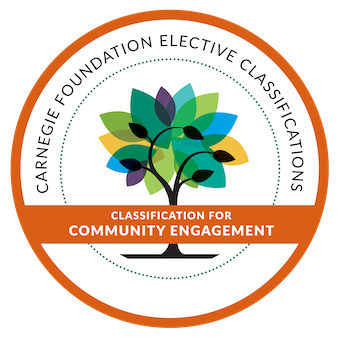Main Content

UW Tacoma Receives 2026 Carnegie Community Engagement Re-Classification
About the classification
The Carnegie Foundation’s Classification for Community Engagement is an elective classification, meaning it is based on voluntary participation by institutions. The elective classification involves a self-study with data collection and documentation of important aspects of institutional mission, identity and commitments, and requires substantial effort invested by participating institutions.
It is an institutional classification; it is not for systems of multiple campuses or for part of an individual campus. The classification is not an award. It is an evidence-based documentation of institutional practice to be used in a process of self-assessment and quality improvement.
2026 Carnegie Community Engagement Re-Classification
When the UW’s three campuses received the Carnegie Community Engagement Classification in 2020, we committed to sustained effort of collaborating with our local communities for the greatest possible impact. In 2025, we developed the application document for the 2026 Carnegie Community Engagement Re-classification, an elective classification, meaning that it requires a voluntary application process by institutions. It is supplemental to the Foundation’s main category (UW Tacoma and Bothell are both M1 institutions; UW Seattle is an R1).
We are delighted that all three campuses were awarded re-classification, demonstrating our commitment to our public mission while building tri-campus capacity for ethical and effective community engagement.
At UW Tacoma, this re-designation as a Carnegie Community-Engaged Campus in 2026, reaffirms our commitment to "Communities", just one of our campus’ strategic goals and strategic priorities. The designation reflects our intention to formalize and deepen our impact through community-engaged teaching, research, and service. It also highlights our shared work with community partners to advance equity, address local priorities, and strengthen the region we call home.
As a primarily urban-serving and access-focused campus, UW Tacoma centers community voice, long-term relationships, and ethical engagement in neighborhoods across Tacoma and throughout the South Puget Sound region and beyond.
Learn More
Learn more about each of the UW’s campuses’ assessment for re-classification as a Community Engaged Campus:
How does the Carnegie Foundation define Community Engagement?
“Community engagement describes collaboration between institutions of higher education and their larger communities (local, regional/state, national, global) for the mutually beneficial exchange of knowledge and resources in a context of partnership and reciprocity.
The purpose of community engagement is the partnership of college and university knowledge and resources with those of the public and private sectors to enrich scholarship, research, and creative activity; enhance curriculum, teaching and learning; prepare educated, engaged citizens; strengthen democratic values and civic responsibility; address critical societal issues; and contribute to the public good.”
UW Tacoma recognizes the definition of community engagement developed by the Carnegie Foundation.
Why does this matter to UW Tacoma?
In 2022, UW Tacoma reaffirmed its strategic plan which recognizes that the most successful UW Tacoma community partnerships are transformative and result in each partner achieving more together then they can alone. Our pursuit of the Carnegie Classification in 2020 (and intent to seek re-classification in 2026) was our way of acknowledging this fact and is both a means and an end. It is a means of becoming more intentional and systematic as an institution about how we develop community engagement infrastructure in alignment with national best practices, including institutional partnership strategy, faculty rewards, curricular integration, and assessment of outcomes for students, faculty, partners, and the institution. It is an end in that it enables us to become a visible member of a national learning community made up of institutions that share our commitment to community engagement.
In other words, it is a means to the end of ensuring that we actually practice what we say is “part of our DNA of being borne of an engaged community” and that we are consistently reflecting upon and improving our practice in collaboration with others.
The 2026 re-classification process allowed UW Tacoma to:
-
Retain UW Tacoma’s Carnegie Community Engagement Classification, first awarded in 2020.
-
Reflect on UW Tacoma’s community engagement practices and assess progress made in response to the 2020 recommendations.
-
Strengthen campus and institutional infrastructure, policies, and supports that advance equitable, reciprocal, and sustainable community partnerships.
-
Leverage the re-classification process to deepen collaboration with community partners and align engagement efforts with UW Tacoma’s mission and strategic priorities.
2026 Carnegie Working Group:
In October 2023, UW Tacoma Chancellor, Dr. Sheila Edwards Lange, and the Office of Community Partnerships convened a 2026 Carnegie Community Engagement Re-Classification Working Group composed of faculty, staff, and community engagement leaders from across academic and central student and core administrative units. The working group collaborated to respond to the Carnegie application, gather data, and develop updated recommendations to guide future engagement efforts.
Timeline for 2026 re-classification process:
- Spring 2024: establish working group and subgroups
- Summer 2024-Winter 2025: Collect data and prepare responses to application questions
- April 1, 2025: Application deadline
- December 2025: Campuses notified by Carnegie Foundation
Carnegie–Identified Institutional Motivations
- Institutional self-assessment — a way to bring the disparate parts of the campus together in a way that advances a cohesive and strategic agenda. At the same time it allows for the identification of promising practices that can be shared across the institution.
- Legitimacy — national public recognition for UW Tacoma’s teaching, scholarship, and service.
- Accountability — a way to demonstrate that the institution is fulfilling its vision and mission partnering and collaborating with our community partners for common good.
- Catalyst for Change — a tool for fostering institutional alignment for community-based teaching, learning, and scholarship.
- Institutional Identity — the classification is a way to clarify institutional identity and mission as an urban-serving institution.
